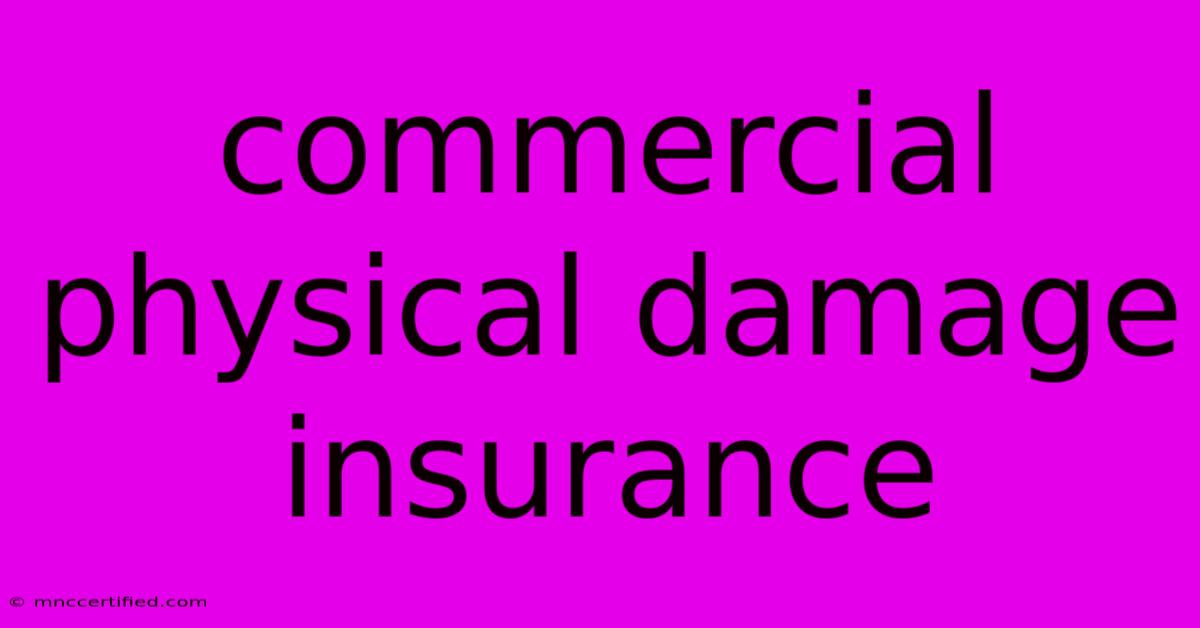Commercial Physical Damage Insurance

Table of Contents
Understanding Commercial Physical Damage Insurance: Protecting Your Business Assets
Your business relies on its physical assets – from buildings and equipment to inventory and vehicles. These assets represent a significant investment, and a single unforeseen event can cause substantial financial losses. That's where commercial physical damage insurance comes in. This essential coverage protects your business against the financial repercussions of damage to your assets, ensuring your operations can continue even after a disaster.
What Does Commercial Physical Damage Insurance Cover?
Commercial physical damage insurance typically covers a wide range of perils, including:
- Fire and lightning: Protecting your assets from fire and lightning strikes, including damage caused by smoke and water.
- Windstorm and hail: Covering damage caused by strong winds, tornadoes, and hailstorms.
- Flooding: Offering protection against damage caused by flooding, often requiring separate flood insurance.
- Earthquake: Covering damage caused by earthquakes, usually requiring a separate earthquake endorsement.
- Vandalism and malicious mischief: Protecting your property from vandalism and intentional damage.
- Theft and burglary: Covering losses due to theft and burglary, including the contents of your building.
- Transportation accidents: Protecting your vehicles and equipment during transit.
Note: The specific coverage provided by commercial physical damage insurance varies depending on the insurer and the policy you choose. Always carefully review the policy details and understand the limitations.
Why Is Commercial Physical Damage Insurance Important?
Here are some compelling reasons to consider obtaining commercial physical damage insurance:
- Financial Protection: This insurance helps mitigate the financial burden of replacing or repairing damaged assets, ensuring your business can recover from a disaster.
- Business Continuity: Protecting your assets allows your business to resume operations more quickly, minimizing downtime and revenue loss.
- Meeting Legal Requirements: Some lenders may require physical damage insurance as a condition for providing loans, particularly for commercial real estate.
- Peace of Mind: Knowing your business is insured against unforeseen events provides a sense of security and allows you to focus on your core business activities.
How to Choose the Right Commercial Physical Damage Insurance
Selecting the right commercial physical damage insurance involves several considerations:
- Identify your needs: Assess your specific assets and determine the potential risks they face.
- Compare quotes: Obtain quotes from multiple insurers to find the best coverage at a competitive price.
- Review the policy: Carefully read the policy details, including the coverage limits, deductibles, and exclusions.
- Seek professional advice: Consult with an insurance broker or agent to discuss your specific needs and ensure you have adequate coverage.
Frequently Asked Questions
Q: How much does commercial physical damage insurance cost?
A: The cost of commercial physical damage insurance varies depending on factors such as the value of your assets, the type of coverage, and the insurer's risk assessment.
Q: What is a deductible?
A: A deductible is the amount you are responsible for paying out-of-pocket before your insurance coverage kicks in.
Q: What are some common exclusions in commercial physical damage insurance?
A: Common exclusions may include intentional damage, wear and tear, and certain types of natural disasters (like nuclear accidents).
Conclusion
Commercial physical damage insurance is a crucial investment for any business owner. It provides financial protection, ensures business continuity, and offers peace of mind. By understanding the coverage options and making informed decisions, you can ensure your business is adequately protected against potential risks. Remember, a little investment in insurance can go a long way in safeguarding your business and its future.

Thank you for visiting our website wich cover about Commercial Physical Damage Insurance. We hope the information provided has been useful to you. Feel free to contact us if you have any questions or need further assistance. See you next time and dont miss to bookmark.
Featured Posts
-
Embrace 2 Watch Covered By Insurance
Nov 11, 2024
-
Hallmark Auto Insurance Phone Number
Nov 11, 2024
-
How Much Is A Barry Bonds Card Worth
Nov 11, 2024
-
Liverpool Vs Chelsea Confirmed Starting Xi
Nov 11, 2024
-
Watch Benfica Vs Fc Porto Live Stream And Tv Guide
Nov 11, 2024